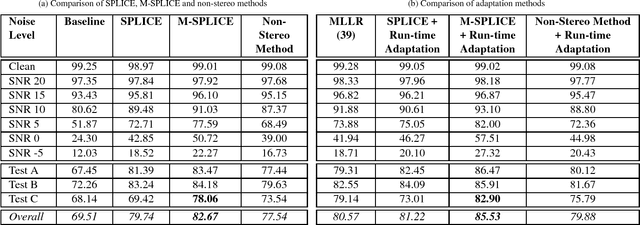Modified SPLICE and its Extension to Non-Stereo Data for Noise Robust Speech Recognition
Paper and Code
Jul 15, 2013



In this paper, a modification to the training process of the popular SPLICE algorithm has been proposed for noise robust speech recognition. The modification is based on feature correlations, and enables this stereo-based algorithm to improve the performance in all noise conditions, especially in unseen cases. Further, the modified framework is extended to work for non-stereo datasets where clean and noisy training utterances, but not stereo counterparts, are required. Finally, an MLLR-based computationally efficient run-time noise adaptation method in SPLICE framework has been proposed. The modified SPLICE shows 8.6% absolute improvement over SPLICE in Test C of Aurora-2 database, and 2.93% overall. Non-stereo method shows 10.37% and 6.93% absolute improvements over Aurora-2 and Aurora-4 baseline models respectively. Run-time adaptation shows 9.89% absolute improvement in modified framework as compared to SPLICE for Test C, and 4.96% overall w.r.t. standard MLLR adaptation on HMMs.
 Add to Chrome
Add to Chrome Add to Firefox
Add to Firefox Add to Edge
Add to Edge